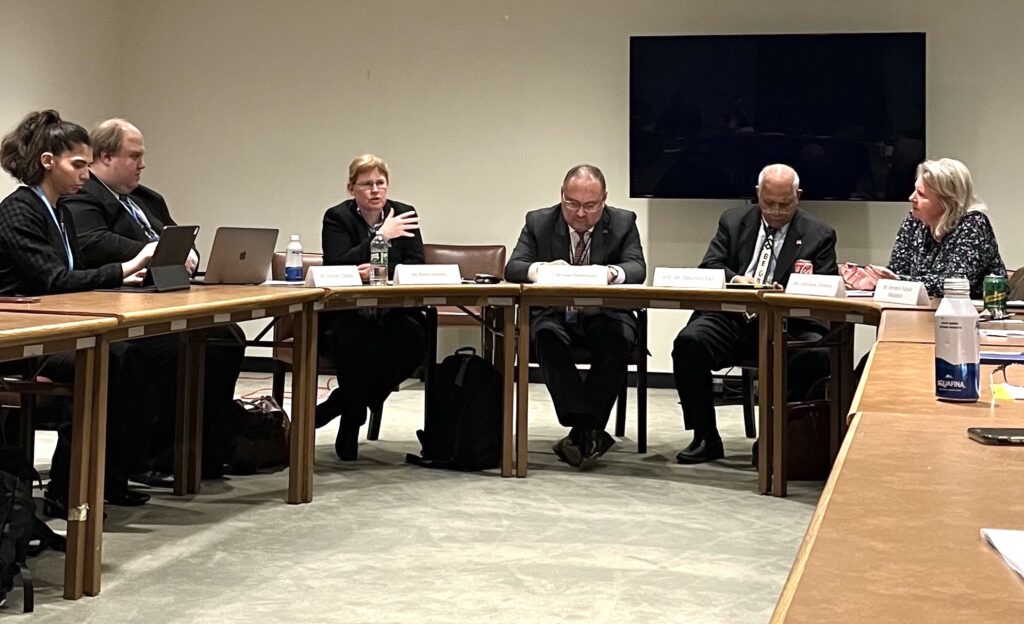States should make addressing the consequences of nuclear weapons a priority in order to achieve the humanitarian purpose of the Treaty on the Prohibition of Nuclear Weapons (TPNW). Articles 6 and 7 of the TPNW include obligations for states parties to assist victims of and remediate environmental harm stemming from nuclear weapons use and testing, as well as to provide international cooperation and assistance to affected states parties. The Vienna Action Plan, adopted at the First Meeting of States Parties in June 2022, dedicated a series of actions to implementing Articles 6 and 7 in an “effective and timely” manner.
Harvard Law School’s International Human Rights Clinic (IHRC) recently published a fact sheet and a response to “Frequently Asked Questions ” on voluntary reporting, designed to highlight key ways for states parties to ensure progress toward implementation of Articles 6 and 7. The publications were produced to inform states parties’ decisions at the TPNW’s Second Meeting of States Parties (2MSP), which will be held November 27 to December 1, 2023, in New York. The publications also complement the work of the intersessional informal working group on Articles 6 and 7, co-chaired by Kazakhstan and Kiribati. The working group has submitted a report to the 2MSP which focuses on three areas of the Vienna Action Plan: national implementation, voluntary state reporting, and an international trust fund.

IHRC has previously explored each of these topics through in-depth publications that analyze relevant precedent in disarmament and other bodies of international law and offer recommendations for addressing them in the nuclear weapons context. The new IHRC publications draw on these previous reports, summarizing their conclusions and updating them for the 2MSP. The publications were presented to states and civil society campaigners at an October 19 side event during the UN General Assembly’s First Committee on Disarmament and International Security.
The 4-page fact sheet offers an overview of IHRC’s findings of steps states parties should take before, during, and after the 2MSP to make progress on national implementation, voluntary state reporting, and an international trust fund. IHRC urges states parties to:
- Endorse the recommendations contained in the report of the co-chairs of the informal working group on Articles 6 and 7;
- Engage in national implementation measures, including completing initial assessments of nuclear weapons impacts and responses to date, developing national plans for addressing those impacts, and sharing progress at the 2MSP;
- Adopt and begin using the voluntary reporting guidelines (recommended information to provide on Article 6 and 7 implementation) and format (a table for providing such information in standardized way) contained in the co-chairs’ report; and
- Agree to engage in focused discussions on an international trust fund for victim assistance and environmental remediation, with the goal of adopting guidelines for establishing an international trust fund at the Third Meeting of State Parties, which should take place in 2025.
The “Frequently Asked Questions” publication responds to common questions and concerns that have arisen regarding voluntary state reporting on the status and progress of implementation of Articles 6 and 7. The publication discusses the importance of all states parties submitting reports, the benefits of adopting the guidelines and format at the 2MSP, how states should respond to potential variation in reports, why the reporting guidelines and format are not burdensome, and the need to ensure the reporting process is inclusive.
Taking tangible steps toward fulfilment of the priorities outlined in the Vienna Action Plan is an opportunity for states parties to make progress toward achieving the humanitarian purpose of the treaty by addressing the human and environmental harms of nuclear weapons use and testing.
For detailed IHRC and recommendations on national implementation, voluntary reporting, and design of an international trust fund, see the following IHRC publications:
- IHRC, Confronting Conflict Pollution: Principles for Assisting Victims of Toxic Remnants of War (September 2020) (with Conflict and Environment Observatory);
- IHRC, Facing Fallout: Principles for Environmental Remediation of Nuclear Weapons Contamination (June 2022) (with Conflict and Environment Observatory);
- IHRC, Designing a Trust Fund for the Treaty on the Prohibition of Nuclear Weapons: Precedent and Proposals (January 2023);
- IHRC, Reporting Guidelines for Articles 6 and 7 of the Treaty on the Prohibition of Nuclear Weapons: Precedent and Recommendations (May 2023).
Clinical students Jacqulyn Kantack JD ’24, Iseult O’Callaghan LLM ’24, and Sabrina Zhang JD ’25 worked on these publications under the supervision of Bonnie Docherty, director of the Clinic’s Armed Conflict and Civilian Protection Initiative.